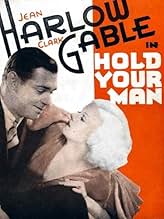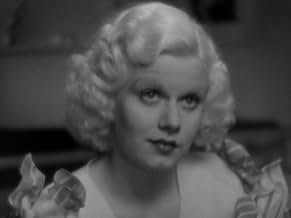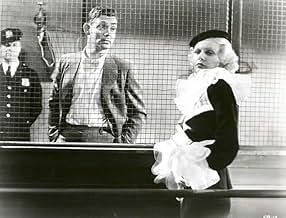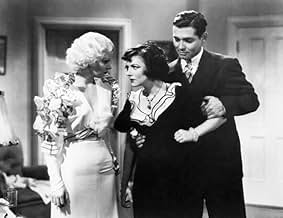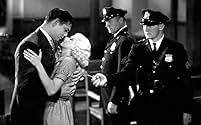Agrega una trama en tu idiomaA woman is sent to a reformatory when her con artist lover flees after killing a man during a botched blackmail scheme.A woman is sent to a reformatory when her con artist lover flees after killing a man during a botched blackmail scheme.A woman is sent to a reformatory when her con artist lover flees after killing a man during a botched blackmail scheme.
- Dirección
- Guionistas
- Elenco
- Premios
- 2 premios ganados en total
Louise Beavers
- Elite Club Attendant
- (sin créditos)
Wade Boteler
- Police Sergeant at Reformatory
- (sin créditos)
Bobby Caldwell
- Ruby & Eddie's Son
- (sin créditos)
Nora Cecil
- Miss Campbell
- (sin créditos)
Jack Cheatham
- Policeman
- (sin créditos)
G. Pat Collins
- Phil Dunn
- (sin créditos)
Nell Craig
- Miss Willard - Reformatory Matron
- (sin créditos)
Opiniones destacadas
Love conquers all. That includes reality as defined in this pre-Code tearjerker. I would sympathize with the moral if the end weren't exaggerated into such a pile of mush. As others point out, the first half is sprightly as Gable and Harlow work the shady side of life. But then Gable accidentally kills a guy, while Harlow gets nabbed for a con job. So it's off to the hoosegow for both. Actually Gable drops out, while we follow Harlow's jaunt in a military- type slammer for women. Babes behind bars it ain't. The girls get to wear shapeless smocks, presided over by a bunch of long black crows (Patterson, et al.). One thing this segment proves—women can march from here to there in lockstep as well as men.
Some pre-Code highlights—Harlow in a gown unruffled by underwear; an actual socialist loudly denouncing the "system"; an unmarried Harlow with-child after an undisguised night with Gable; a peek-a-boo with Harlow in the bathtub. And though it's not pre-Code, the black minister and his inmate daughter rise above stereotype of the day. In fact, Theresa Harris is so winning as daughter Lillie Mae, she nearly steals the show. I can see why she had such a long career, even if mainly as menials.
The movie's a good look at MGM's golden twosome in their prime. And if the material falters, the stars manage to shine. So fans should be happy, despite the soggy ending.
Some pre-Code highlights—Harlow in a gown unruffled by underwear; an actual socialist loudly denouncing the "system"; an unmarried Harlow with-child after an undisguised night with Gable; a peek-a-boo with Harlow in the bathtub. And though it's not pre-Code, the black minister and his inmate daughter rise above stereotype of the day. In fact, Theresa Harris is so winning as daughter Lillie Mae, she nearly steals the show. I can see why she had such a long career, even if mainly as menials.
The movie's a good look at MGM's golden twosome in their prime. And if the material falters, the stars manage to shine. So fans should be happy, despite the soggy ending.
"Hold Your Man" is significant as Harlow's transitional film from the pre-code days. Although technically the Hays Code did not go into effect until July 1934, studios were to some extent trying to police themselves earlier than that to take some of the heat off. Harlow is significantly de-tuned physically here, from the hot presence a year earlier in "Red-Headed Woman" and "Red Dust". It also appears that to illustrate their ability to police themselves without a formal approval process, the studio tacked on a moralistic second half that turned a very entertaining romantic comedy into a sappy melodrama.
The film begins when depression-era hustler Eddie (Clark Gable) and his pal Slim con a pedestrian out of $30. Running from the police he blunders into an apartment and finds Ruby (Harlow) taking a bath. Ruby turns out to be a bit of a con artist herself and gets rid of the police. Eddie takes off but he has made an impression on Ruby and she arranges an "accidental" meeting. They soon fall in love but their marriage plans are interrupted by Eddie's accidental murder of one of Ruby's marks. He gets away but Ruby gets two years in a reformatory, which is portrayed as an intense Home Economics class.
Until it crashes and burns at the end this is a slick little romantic comedy written by Anita Loos (Gentlemen Prefer Blondes). Gable provides his standard bravado and Harlow gives it right back to him. The script is quite clever and entertaining. Gable does not have quite the chemistry with Harlow that he had with Claudette Colbert or Rosalind Russell, but this is the kind of film that is best when its two stars are competing instead of cuddling.
Unfortunately the audience's identification impulse and emotional connection are casualties of Harlow's abrupt personality change from gritty seductress to dewy-eyed self-pitying victim. This confuses and distances those who were most involved in the story until that point.
Then again, what do I know? I'm only a child.
The film begins when depression-era hustler Eddie (Clark Gable) and his pal Slim con a pedestrian out of $30. Running from the police he blunders into an apartment and finds Ruby (Harlow) taking a bath. Ruby turns out to be a bit of a con artist herself and gets rid of the police. Eddie takes off but he has made an impression on Ruby and she arranges an "accidental" meeting. They soon fall in love but their marriage plans are interrupted by Eddie's accidental murder of one of Ruby's marks. He gets away but Ruby gets two years in a reformatory, which is portrayed as an intense Home Economics class.
Until it crashes and burns at the end this is a slick little romantic comedy written by Anita Loos (Gentlemen Prefer Blondes). Gable provides his standard bravado and Harlow gives it right back to him. The script is quite clever and entertaining. Gable does not have quite the chemistry with Harlow that he had with Claudette Colbert or Rosalind Russell, but this is the kind of film that is best when its two stars are competing instead of cuddling.
Unfortunately the audience's identification impulse and emotional connection are casualties of Harlow's abrupt personality change from gritty seductress to dewy-eyed self-pitying victim. This confuses and distances those who were most involved in the story until that point.
Then again, what do I know? I'm only a child.
Jean Harlow plays a streetwise dame who falls for charming con man Clark Gable. After Gable accidentally kills a guy, he takes off and leaves Harlow to take the rap. She winds up in a women's reformatory where she discovers she's pregnant. Mix of romantic comedy and drama helped a lot by the immense likability and sublime chemistry of its two leads. Harlow is terrific. One great scene has a floozy slapping Jean, only to get a punch in the kisser in return. The floozy tries it again later and gets the same results! Gable is as roguish as ever. It's hard to dislike him, even when he plays a cad. Love the girls at the reformatory. They're fun characters with some great lines. The sweet ending will please everybody but cynical types. Harlow fans should love this one.
I always loved Rita Hayworth and Ava Gardner, but not so much Jean Harlow. Me = dumb. I'd only seen clips of her films here and there. I always thought she was a hot one-liner, a glamour girl. But after seeing this, my first full length Jean Harlow experience, I admit that Miss Harlow was a truly great screen artist with the gift of creating rich characters. I simply fell in love with her, not because she was the first blonde bombshell or because she died young and became a legend. In this film, Miss Harlow's character is multi-dimensional beyond the traditional 1930's moll. She starts out one place and travels an arduous journey to end up on the other side of life. I loved her tough exterior. I loved her smile. I loved her song at the piano. My God, she was stupendous, she made me burst into tears when she sang her sad song. Most of all, I loved the HAPPY ENDING, Hollywood style. One other thing I was thrilled about was the African American inmate and her preacher father. Anita Loos was SO ahead of her time. She wrote 2 characters who were so lovely and so real. The inmate girl and her father brought such harmony to their scenes with all the white folk. A REVELATION for me. I hate stereotypes.
Clark Gable plays a con man who busts into the life of hard-boiled dame Jean Harlow. He tries to sucker her while she brushes him off with her tough-gal attitude. Despite their cynicism and cons they fall in love. When Gable accidentally kills a man during a sting he runs out leaving loyal Harlow to women's prison where she discovers she's pregnant. Anita Loos' and Howard Emmett Rogers' writing is excellent throughout with many well-drawn and surprising characters (including a Jewish socialist woman inmate and a black woman inmate and her preacher father played with hardly a trace of stereotype). Gable and Harlow show their mettle as actors adding telling nuances and quirks to their characters that send them beyond the typical Gable and Harlow roles. And the direction is much better than you'd expect from Sam Wood. One beautiful shot has Harlow being inducted into the prison, then led out into a surprisingly snowy courtyard as the camera tracks after her. This is one of the best of both the "criminals in love" and "women's prison" genres and has some of the best hard-boiled dialogue ever written.
¿Sabías que…?
- TriviaWhen Eddie is looking around Ruby's apartment, waiting for his clothes to dry, he spots a pennant on the wall that says "Albany Night Boat." That refers to the steamships that would depart New York City in the early evening for an overnight trip up the Hudson River to Albany. The ships had hundreds of staterooms and often were used---as the film's contemporary audience would know---for romantic getaways or illicit affairs. The pillow Eddie sees next also may have been a souvenir from the ship, as it's inscribed, "We're here to-day/To-morrow we're through/So let's be gay/It is up to you." Such trips peaked in the early 20th century, but started to decline in the 1930s when less costly, speedier, and more efficient modes of transportation by rail and automobile came to the fore. By the 1940s, the Albany Night Boat had virtually ceased to exist.
- ErroresWhen Eddie slams the door after tossing Aubrey Mitchell out of the apartment, the wall shakes.
- ConexionesFeatured in Polvorilla (1933)
- Bandas sonorasHold Your Man
(1933) (uncredited)
Music by Nacio Herb Brown
Lyrics by Arthur Freed
Played on a record and sung by Harriet Lee
Reprised by Jean Harlow, playing piano and singing
Selecciones populares
Inicia sesión para calificar y agrega a la lista de videos para obtener recomendaciones personalizadas
- How long is Hold Your Man?Con tecnología de Alexa
Detalles
Taquilla
- Presupuesto
- USD 266,000 (estimado)
- Tiempo de ejecución1 hora 27 minutos
- Color
- Relación de aspecto
- 1.37 : 1
Contribuir a esta página
Sugiere una edición o agrega el contenido que falta

Principales brechas de datos
By what name was Hold Your Man (1933) officially released in India in English?
Responda

